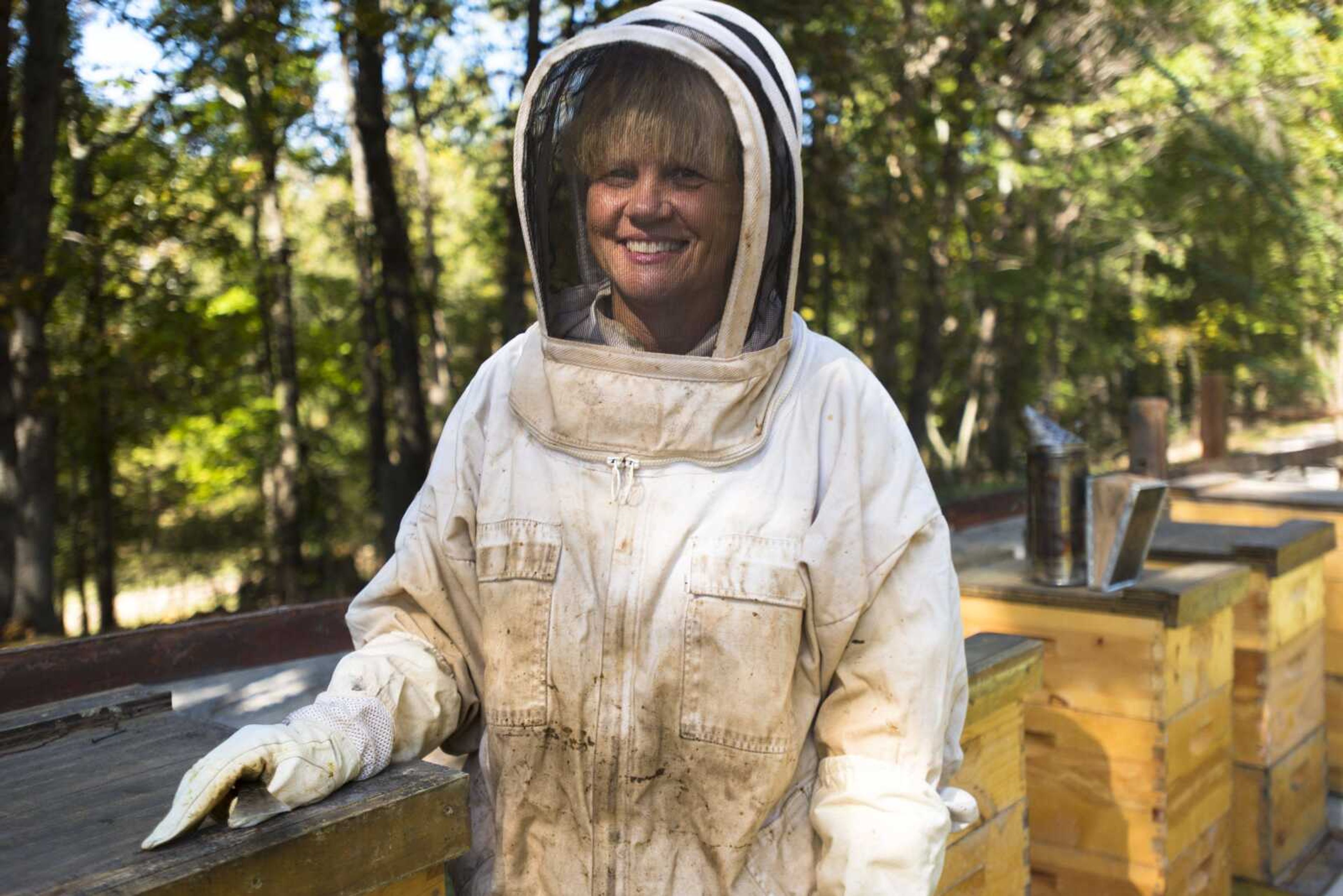The local bee keepers
A “Certified Bee Friendly Farm” sign hangs on Jodi Freeman’s chicken coop in her garden to note she doesn’t use chemicals and pesticides on her plants so as to not harm her honeybees. Freeman, who has lived in Cape Girardeau for the past nine years, is one of many beekeepers in the area. She first became interested in beekeeping in 2015 after seeing an advertisement for a beehive startup business on Facebook. "It was Flow Hive, it was a company out of Australia and they had done their startup campaign and they had this video and they showed the mechanisms of how the flow hive worked and how it was not harming the bees," she says...
A “Certified Bee Friendly Farm” sign hangs on Jodi Freeman’s chicken coop in her garden to note she doesn’t use chemicals and pesticides on her plants so as to not harm her honeybees.
Freeman, who has lived in Cape Girardeau for the past nine years, is one of many beekeepers in the area.
She first became interested in beekeeping in 2015 after seeing an advertisement for a beehive startup business on Facebook.
"It was Flow Hive, it was a company out of Australia and they had done their startup campaign and they had this video and they showed the mechanisms of how the flow hive worked and how it was not harming the bees," she says.
She says the extraction process with the flow hives is less invasive than typical beekeeping because it allows the honey to flow out the side of the hive, rather than having to open up the hive box, pull out frames and extract the honey by hand.
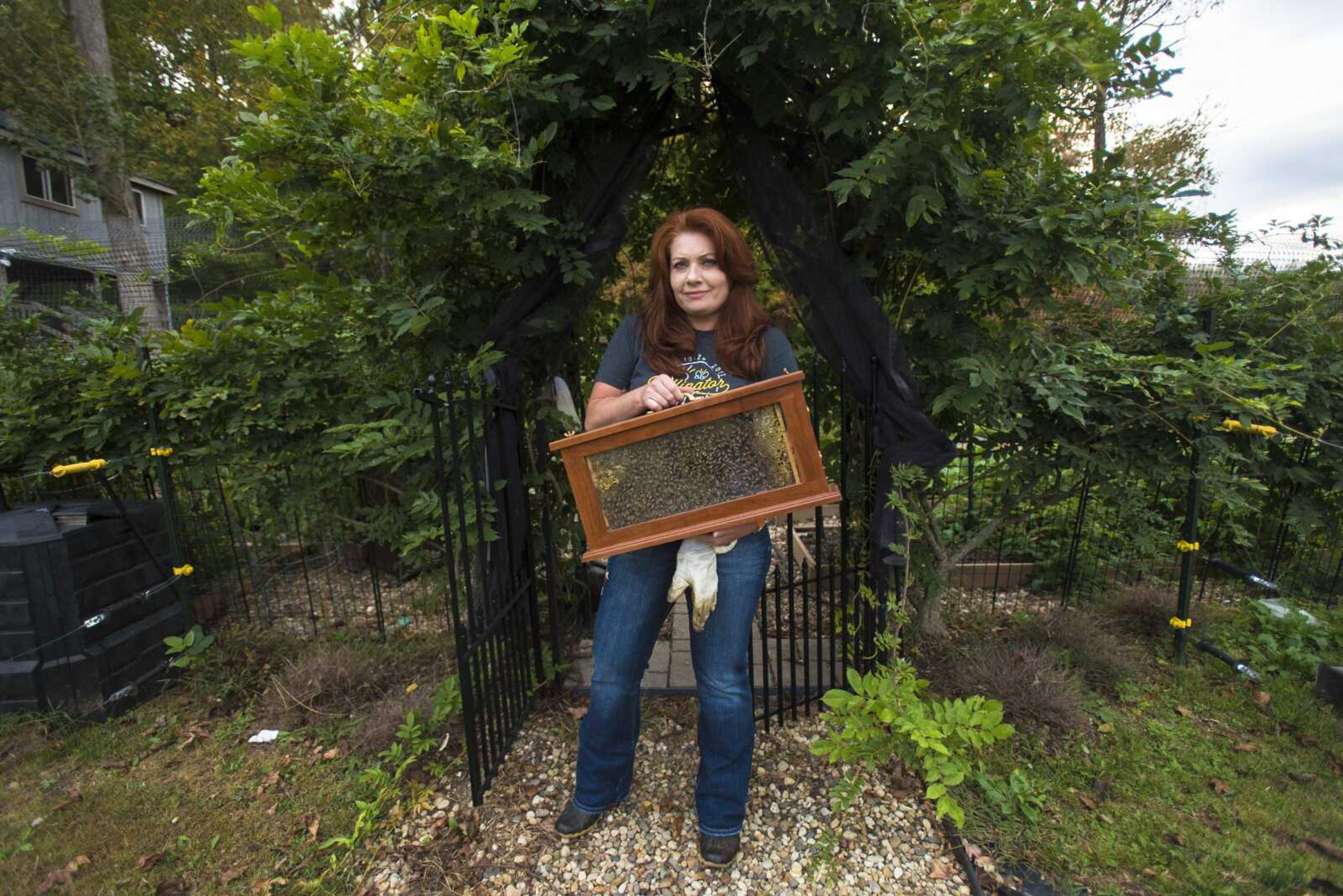
"The way they showed this, it looked like it was a very easy and neat way to do it, so I thought, 'That's nice, I'll get into beekeeping.'"
Once interested, Freeman bought her hives and then she attended a three-day beekeeping school in Wingo, Kentucky. She currently has two Flow Hives, a top bar hive that allows easier access closer to the ground, and some standard hives.
"They taught us all about swarms and about all the different methods of beekeeping, and we went through grafting, which basically you're making your own queens, and again I got a little bit more fascinated by everything," she says.
She ordered her bees from a bee seller in Paducah, Kentucky.
"Then I started beekeeping and just kind of evolved into more and more hives and more and more bees," she says with a laugh.
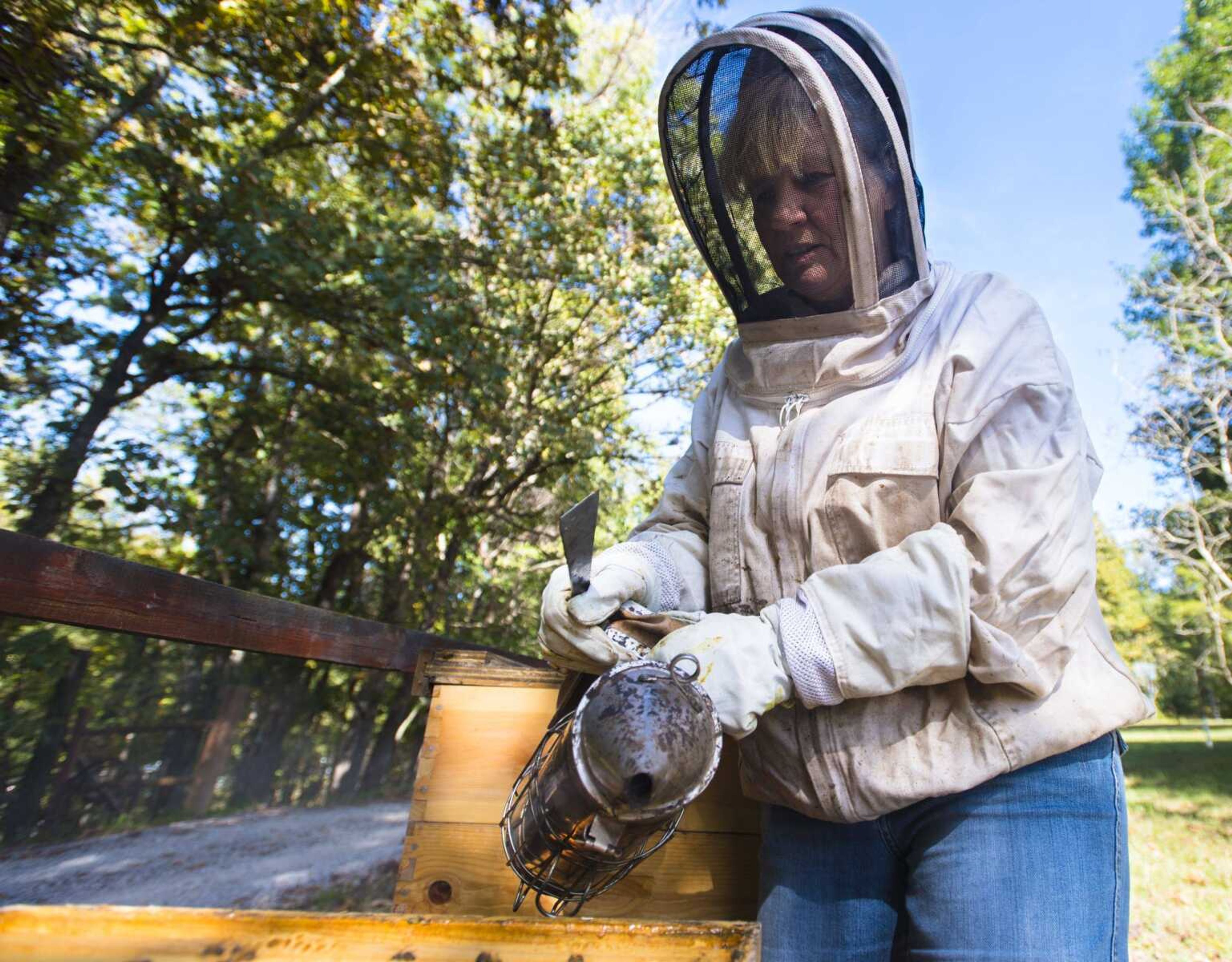
Along with buying bees, Freeman has done a "cutout" in Grand Tower, Illinois, where bees had built their hives in the walls of an old building. She vacuumed all the bees up safely and brought them to her property in Cape Girardeau.
"It was amazing to see them build in a natural environment, what was natural to them, how they just built all the way down between the 2-by-4 studs these long columns of honeycomb," she says. "It was neat."
The best part of beekeeping for Freeman is being able to help local plants and crops be pollinated and seeing them flourish over time.
"I think truly it is helping pollinate the plants," she says. "I think anything that we can do to help sustain our living I think is a good thing."
The bees have even helped the crops in her garden continue to grow past their typical growing season into the fall months.
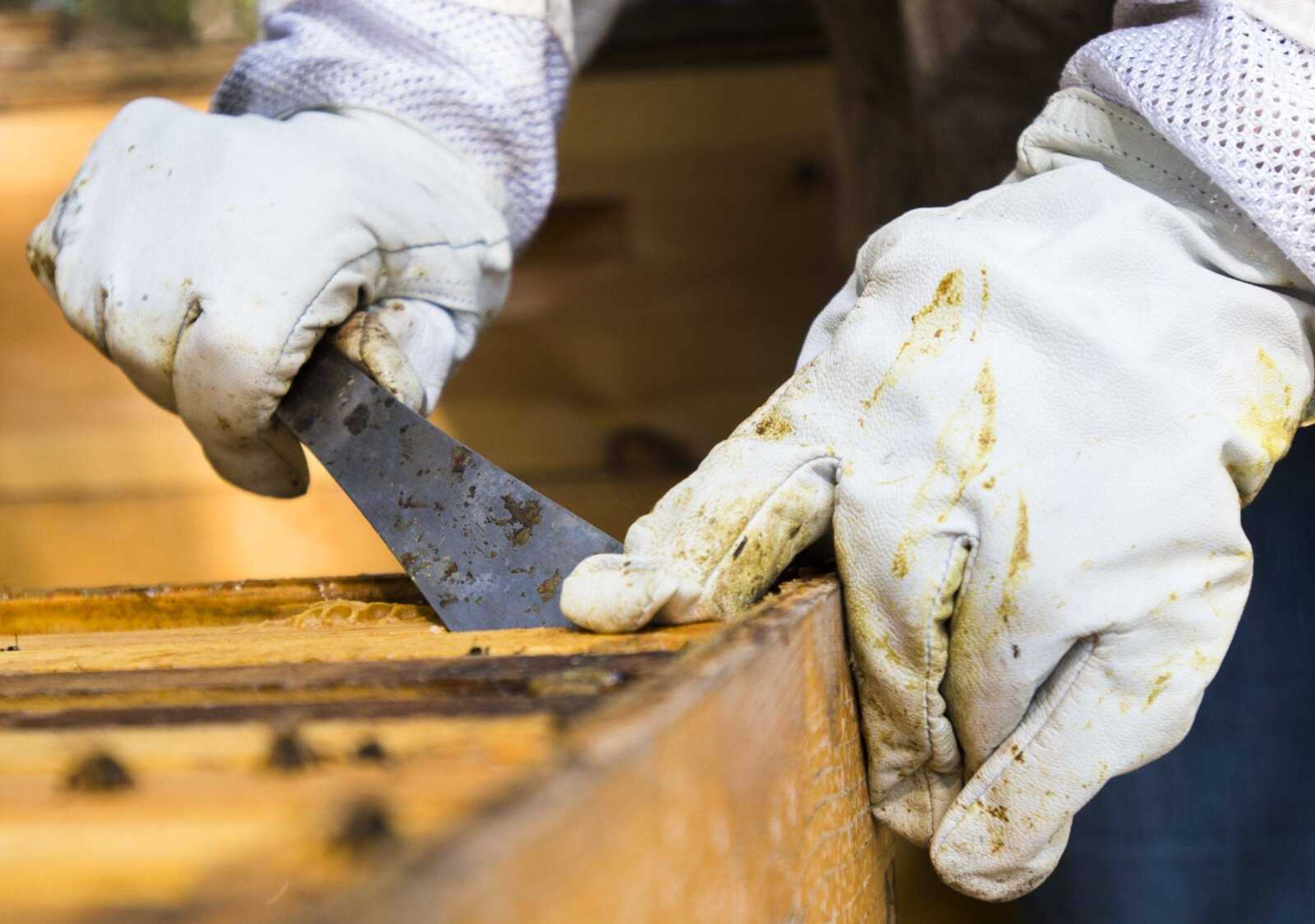
"Some farmers will even pay you to rent out your hives for their crops and then you can still benefit from the honey and you're helping the environment and helping our food sources," Freeman says. "I can always see it being something I will continue to do. There's always a reason to have more bees."
She says her bees will forage all the way from her home near Dalhousie Golf Club to down by the Mississippi River.
"They're working not just in my backyard, but in all these farmlands around here, too," she says. "I think it's very important."
Doug and Carmen McNeely of Jackson started beekeeping four years ago as a project for them to maintain during their retirement years.
"We wanted to do something that we could do together and something to keep us busy," Carmen says.
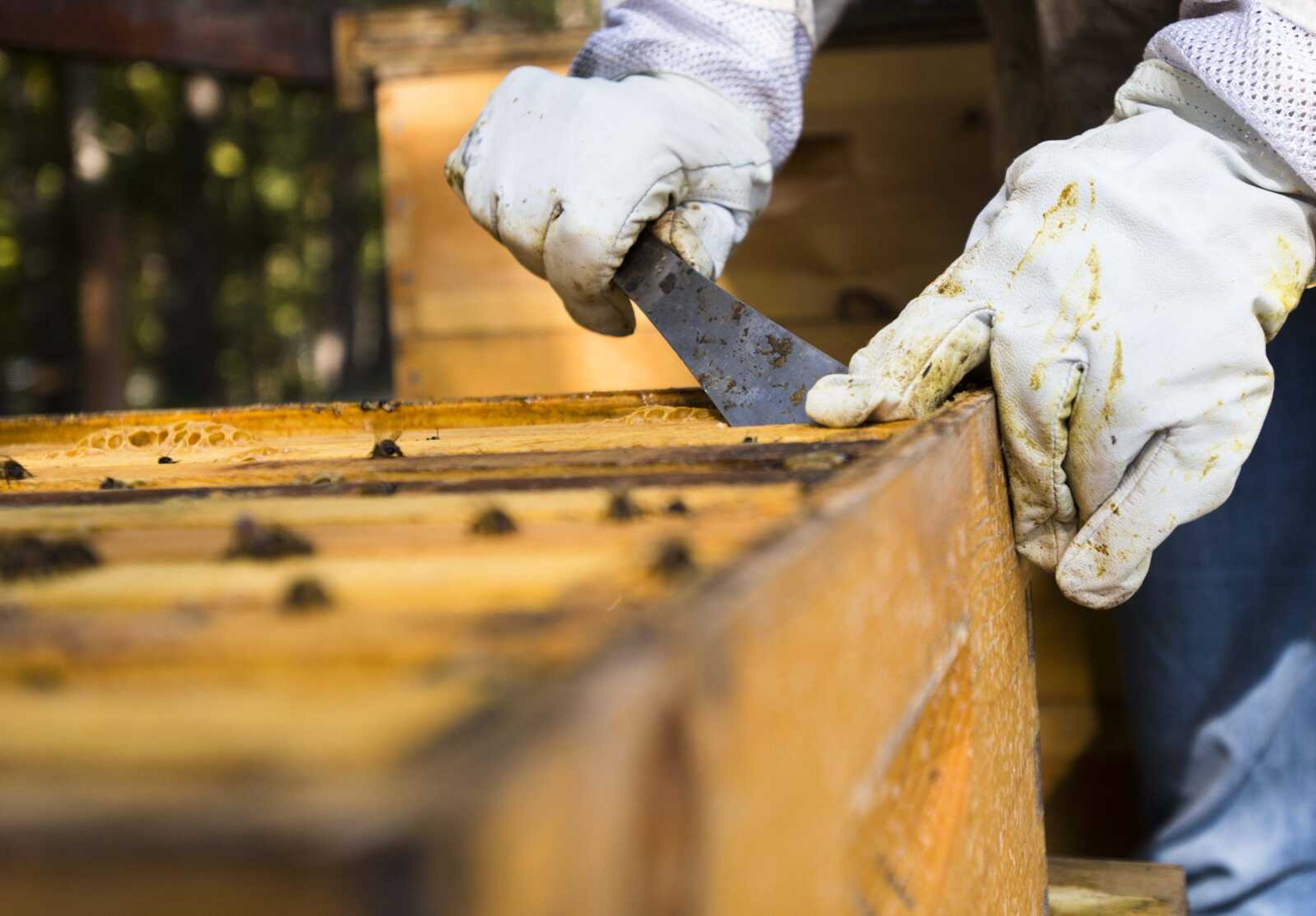
They started with 12 hives and have since grown to around 90, with a goal of 100 by the spring.
"Most people get one or two," she says, laughing. "We got 12 the first year and then the second year we bought 30 more. So we wanted to get our numbers while we were still working and have all that equipment bought."
Although beekeeping has been a successful venture for the McNeelys, Carmen says there are several struggles they face throughout the year.
"We knew we were going to get stung, and that's not really an issue for us anymore," she says. "At first it swells. It still hurts when you get stung, but we don't swell up or anything. It's still not fun to get stung. We just worry about them surviving the winter, No. 1, and there are other things."
They mention hive beetles and other pests like mites and wax moths that can come in and invade a hive when its numbers have been weakened. To combat the pests and ensure their hives are healthy, the McNeelys check them about once a week during the spring.
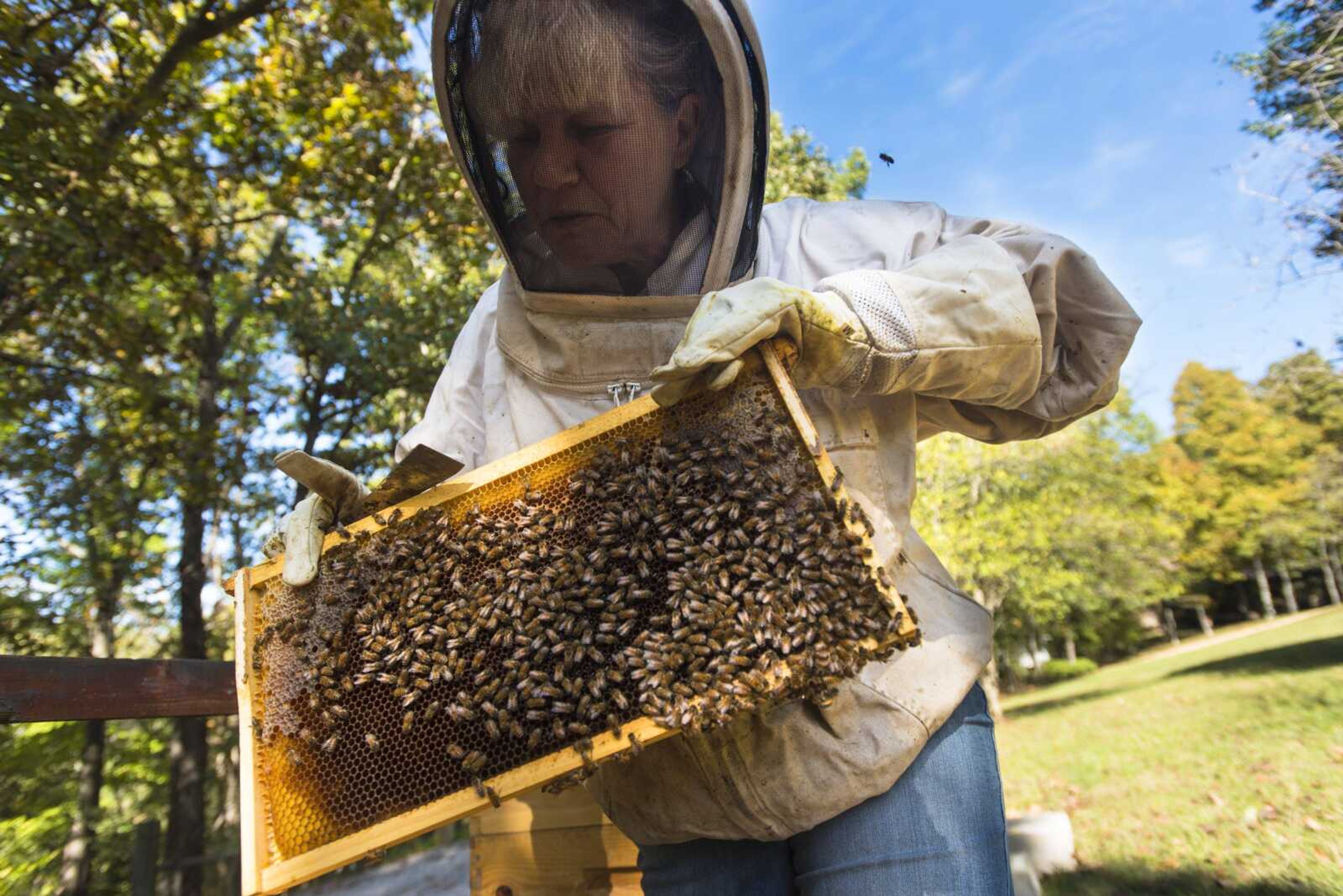
"That's why we kind of check them once a week, to make sure [they're staying healthy] ... in the spring," Carmen says. "You've got your new queens, especially the new ones, even the old ones, that your queen's laying a good pattern and lots of brood."
At any given point during the summer, Carmen says a strong hive can hold up to 60,000 bees.
The winter months are a different story, though. With a fall honey flow from August through September typically, the bees build up enough honey to last them for nourishment throughout the winter months.
"This time of year you don't want to mess with them, especially in the winter if it's cold, you don't want to bust their cluster because they cluster up and keep each other warm," Carmen says. "So if you bust that cluster they're more apt to freeze, especially if it's really cold."
They put dry sugar in the top of the hives to help supplement the bees' fall honey store and let them be, so as not to risk harming their chance of survival through the colder months of the year.
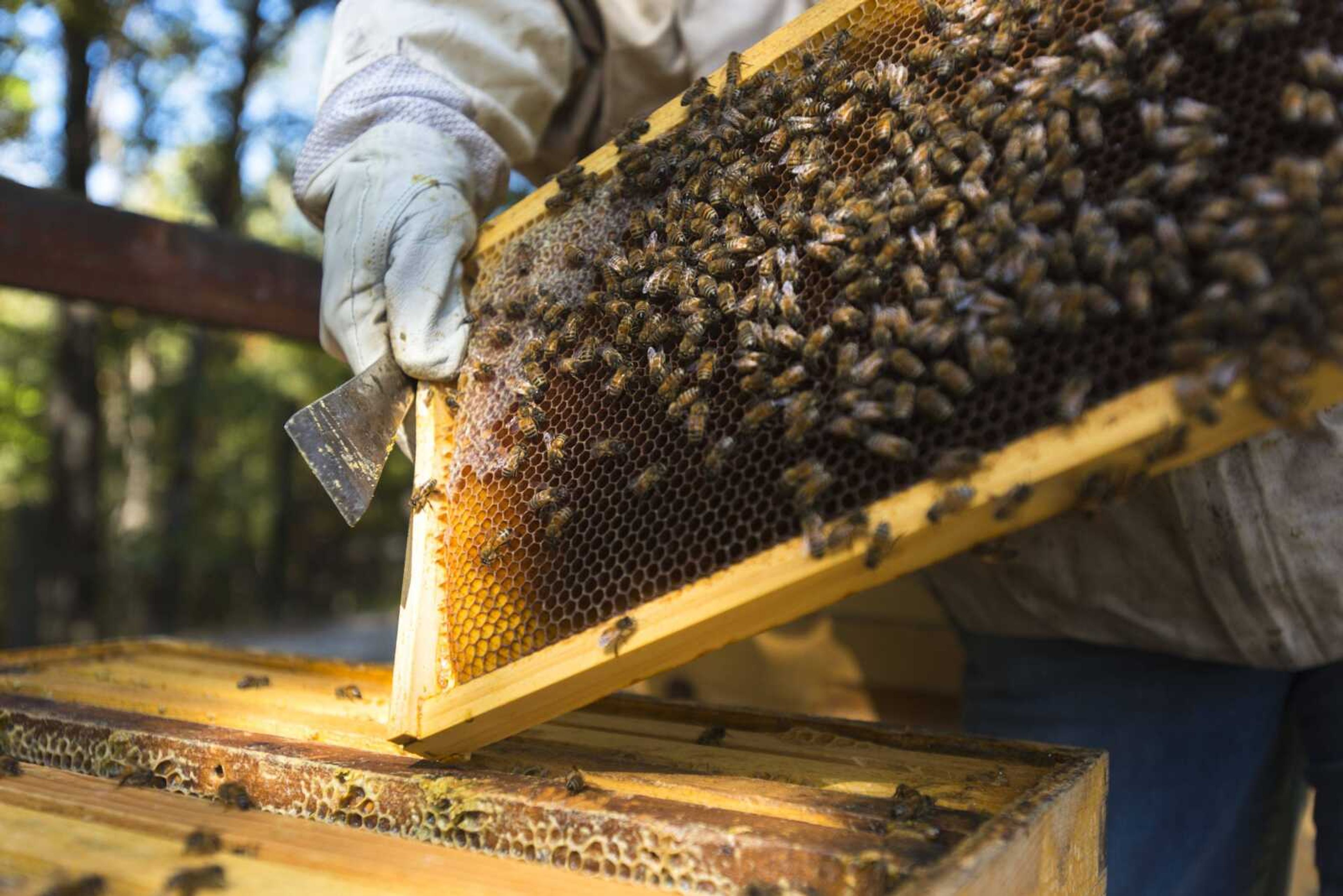
Carmen began selling her honey under the name Indian Creek Hives this year at the Cape Girardeau Riverfront Market. She also makes a hand lotion and lip balm to go with the honey.
"Indian Creek actually runs all the way from down 177 and we have several of our hives, because his dad's property, the creek runs right through it," she says. "We have a lot down there, and my mom lives right at Trail of Tears Park, which Indian Creek ends right there. So that's basically why we called it Indian Creek."
Carmen says she enjoys beekeeping because every hive is its own sort of ecosystem, with different conditions and different bees with different personalities.
"I think it's just interesting, and it seems like every hive is kind of different too," she says. "What you do for one hive may not work for the other one, but I don't know. I just think it's very interesting."
It takes a good amount of time for bees to build a honeycomb for honey production, according to Carmen. First they have to fill their brood boxes, where the queen lays eggs and the baby bees grow to adulthood.
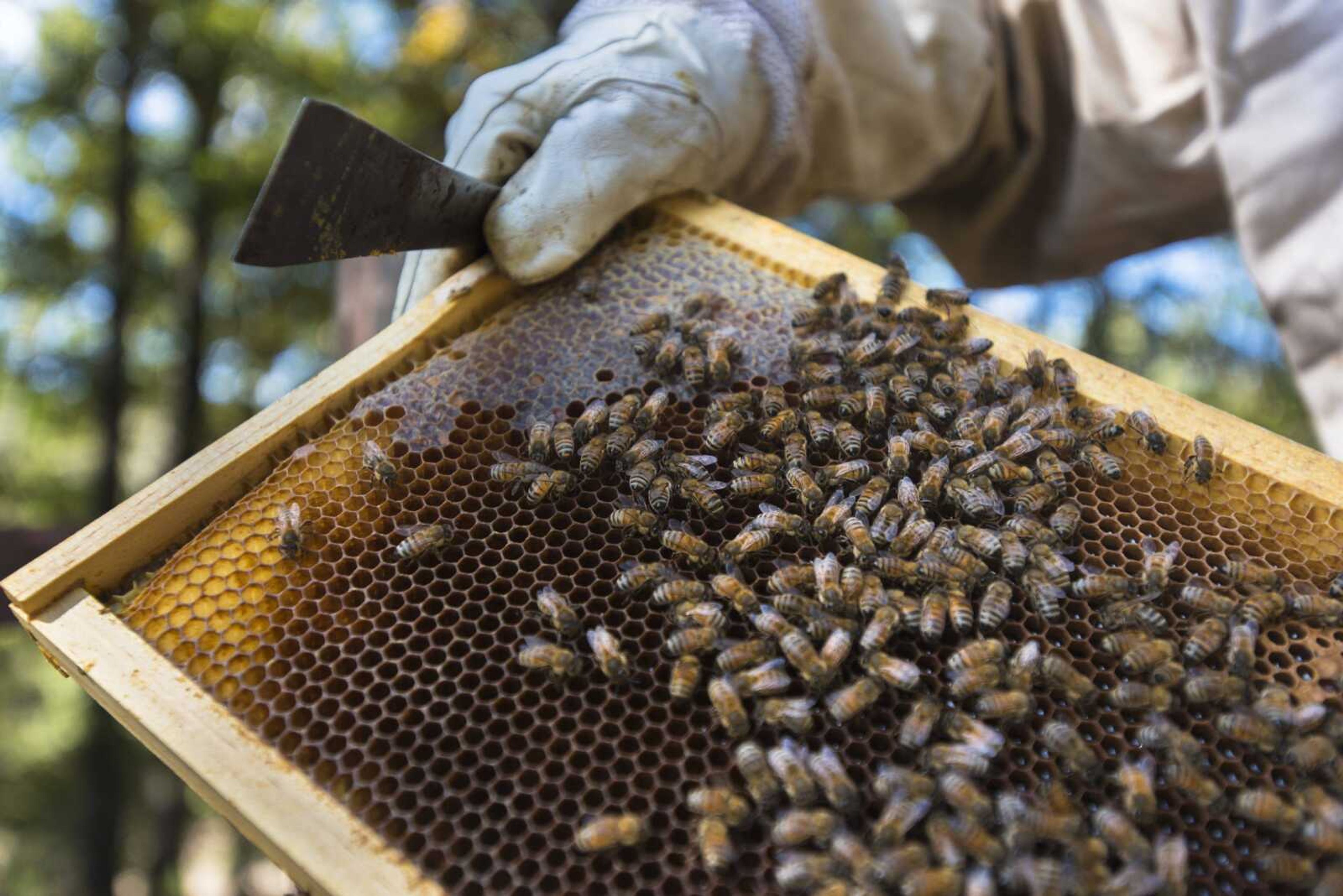
"It's not going to happen in a year," she says. "You want them to draw out their two brood boxes the first year, but to get them to draw out then a honey box too -- it's not going to happen the first year."
The McNeelys have an 18-frame extractor to help extract the honey from the beehive frames, and their first year beekeeping they only used it twice.
"But we turn it on a little more now," she says laughing, "which is good."
Much like Freeman, the McNeelys strategically place a number of their hives to help build up the gardens of their neighbors and family. Carmen says the hives near her in-laws' property have helped especially.
"They have a big garden, and their garden has never been better since we've had the bees down there," she says.
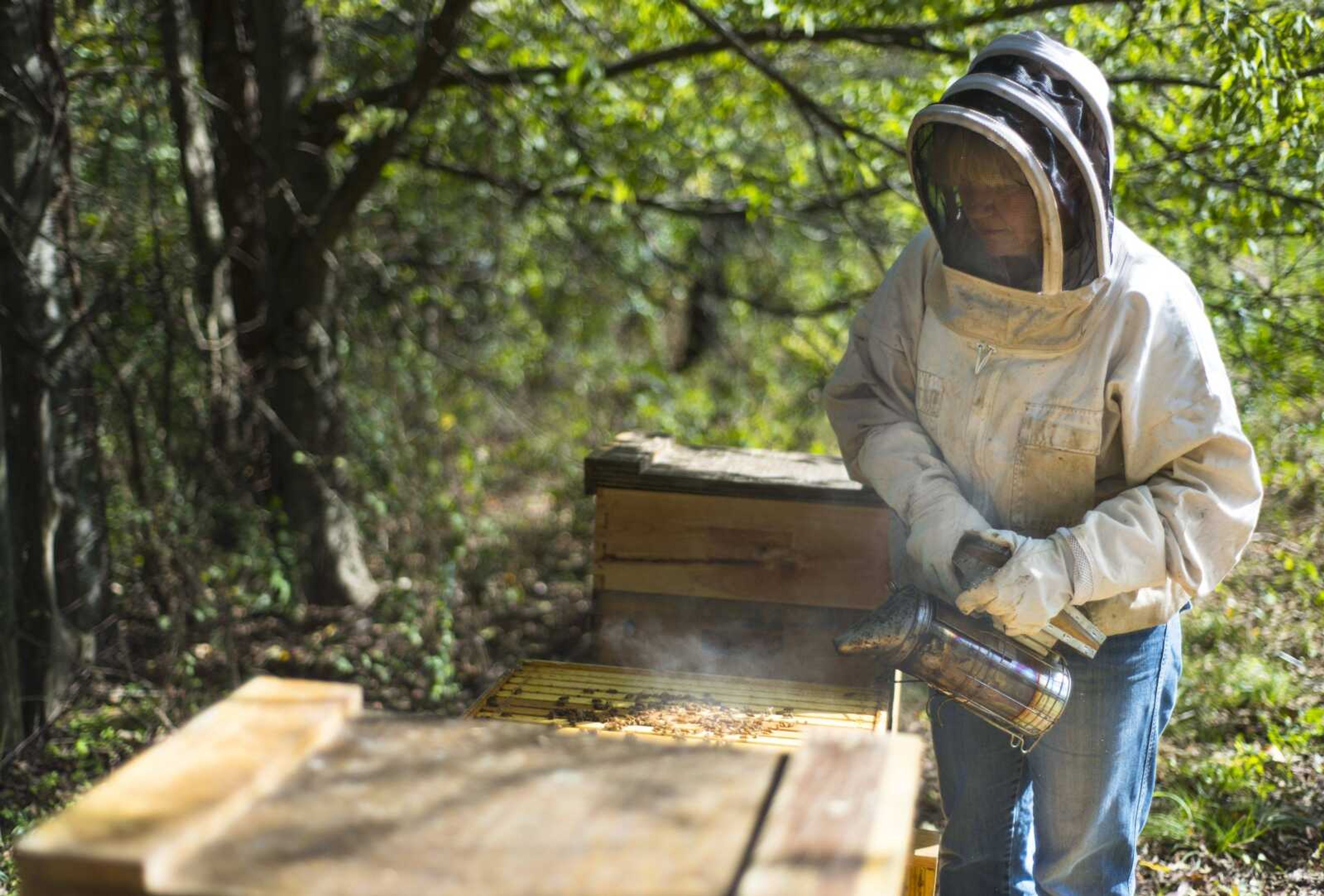
The McNeelys and Freeman are members of the Jackson Area Beekeepers Association, which meets the last Tuesday of every month except during the coolest months of the year.
"It's a good way to learn," Carmen McNeely says. "We learn something every time we go and we've been going now for four years."
For updates and more information about the association or to get involved, contact Grant Gillard at (573) 243-6568.
Connect with the Southeast Missourian Newsroom:
For corrections to this story or other insights for the editor, click here. To submit a letter to the editor, click here. To learn about the Southeast Missourian’s AI Policy, click here.

